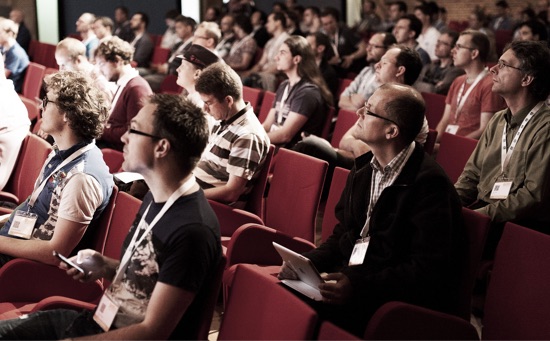productivity
62 RESULTS
48:56

Developer Productivity Panel
GOTO Amsterdam 2024
45:33

Your Brain on Software Development
GOTO Copenhagen 2018
27:51

The Science of Sleep
GOTO Copenhagen 2018
46:46

Developer Productivity With IntelliJ IDEA
YOW! Melbourne 2024
54:47

Forget Velocity, Let's Talk Acceleration
GOTO Copenhagen 2017
39:41

When It’s Time to Change, Then It’s Time To Change … A Talk on Adaptability
GOTO Chicago 2023
46:46

Developer Productivity With IntelliJ IDEA
YOW! Sydney 2024
46:46

Developer Productivity With IntelliJ IDEA
YOW! Brisbane 2024

Are Your Tests Slowing You Down?
GOTO Copenhagen 2025
46:14

40 Jenkins Features & Plugins You Wished You had Known about Before!
GOTO Copenhagen 2018
41:48

Why You Need a Software Delivery Machine
GOTO Copenhagen 2018
52:08

Small Steps Are the Fastest Way Forward: Life Beyond Agile & Scrum
GOTO Amsterdam 2023
50:06

Why You Need a Software Delivery Machine
GOTO Chicago 2019

From Lag to Lightning: Confident, Automated Changes at Scale
GOTO Copenhagen 2025
42:07

Bridging the Gap: How Data & Software Engineering Teams Can Work Together to Ensure Smooth Data Integrations
GOTO Chicago 2023
52:09

It's a Noisy World Out There
GOTO Chicago 2023
49:56

One Rule to Rule Them All
GOTO Chicago 2023
29:40

The Sociotechnical Path to High-Performing Teams
GOTO Chicago 2023
40:56

"Zero Trust" is for Networks, Not Your Teams
GOTO Chicago 2023
37:31

Is Software Engineering Real Engineering?
GOTO Chicago 2023
42:27

How to Reverse Software Entropy
GOTO Chicago 2023
34:59

More Buzzwords Won't Help: The Long History of DevOps Failures
GOTO Chicago 2023
40:27

Shaping The Future of Developer Productivity with Backstage
GOTO Aarhus 2023
42:15

Navigating Backstage: A Year in Developer Life
GOTO Amsterdam 2024
41:41

Building HTTP API SDKs that Really Are a Kit
GOTO Copenhagen 2019
38:11

Bringing Automation to Web App Hosting and Deployment
GOTO Berlin 2019
39:24

Mob Programming and the Power of Flow
GOTO Berlin 2019
44:46

Prioritizing Technical Debt as if Time and Money Matters
GOTO Copenhagen 2019
49:29

The 5 Pillars of Collaborative Product Ownership
GOTO Copenhagen 2019
47:07

Deprecating Simplicity 4.0
GOTO Copenhagen 2019
30:03

Embedded Application Development (for Web Developers)
GOTO Berlin 2019
40:16

Amazing Code Reviews: Creating a Superhero Collective
GOTO Berlin 2019
46:23

Lies, Damned Lies, and Metrics
GOTO Copenhagen 2019
38:36

Migrating Spring Boot Apps from Annotation-based Config to Functional with Kotlin
GOTO Amsterdam 2019
45:50

Mastering the Linux Command Line
GOTO Amsterdam 2019
33:00

Troubleshooting Tiered Tragedy: A Peek Into Failure
GOTO Berlin 2019
48:16

PopcornFlow: If Change is Hard, Make it Continuous
GOTO Berlin 2019
41:58

Building Evolutionary Infrastructure
GOTO Amsterdam 2019
45:48

In Search of the Perfect Cloud Native Developer Experience
GOTO Amsterdam 2019
49:52

Knowledge is Power: Getting out of Trouble by Understanding Git
GOTO Amsterdam 2019
48:36

Mind as Code - Mindfulness for Developers and Knowledge Workers
GOTO Copenhagen 2019
35:40

Work Less and Do More: Google Sheets for Developers
GOTO Copenhagen 2019
40:41

What Engineering Managers Should Do (and Why We Don’t)
GOTO Berlin 2019
43:29

Building Better Products Faster: DevUx is the New DevOps
GOTO Berlin 2019
32:42

Kubernetes Day 3: The State of Kubernetes Development Tooling
GOTO Berlin 2019
36:30

Modern Continuous Delivery
GOTO Berlin 2019
44:56

Introduction to OpenAPI
GOTO Copenhagen 2019
33:46

Building Resilient Frontend Architecture
GOTO Berlin 2019
47:04

Experiment to Innovate
GOTO Berlin 2019
40:44

Making Mutants Work for You
GOTO Copenhagen 2019
29:11

A Kick in the Butt for Developers #devemp
GOTO Berlin 2019
38:27

Moving Fast At Scale
GOTO Berlin 2019
41:56

Visualizing Cloud Systems
GOTO Berlin 2019
36:21

Doubling Engineering Productivity at eBay Through DevOps
YOW! London 2022

Leading 3000 Developers into the Next Era of Software Engineering
GOTO Copenhagen 2025

Three Words to Remember When Working with People’s Motivation and Productivity: Autonomy, Competence, Relatedness to Others
GOTO Copenhagen 2025

Developer Productivity at a Developer Productivity Startup
GOTO Copenhagen 2025

Tips to Prevent Burnout
April 23, 2021

Putting a Prompt into Production
August 16, 2024

Enhancing Productivity with Aesthetics, Tools, and AI
September 19, 2024
Browse all tags
Here

